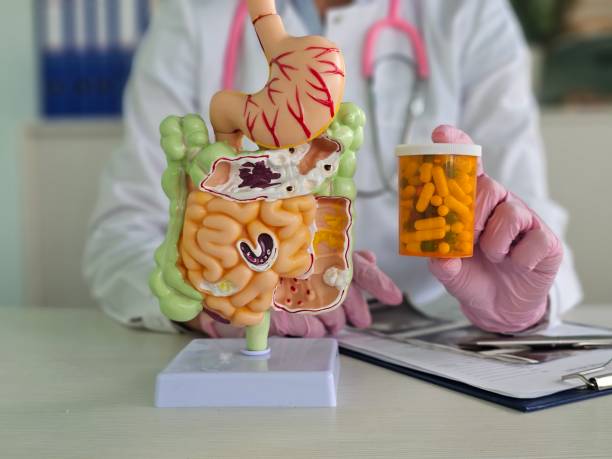Celiac Disease vs. Crohn’s disease: These two gut-related diseases have major differences, which can be understood by their symptoms.
Here, we share complete information about these diseases to help you understand the difference between celiac disease and Crohn’s.

1. Crohn’s disease
One of our gut problems is called Crohn’s disease. It is commonly known as inflammatory bowel disease. This causes inflammation in the digestive tract and can cause problems such as abdominal pain, diarrhea, fatigue, and weight loss.
This inflammation can occur in any part of the digestive system. Sometimes it can also have a major negative effect on abdominal tissue. This problem can cause anything from minor abdominal pain to life-threatening complications.
According to doctors, the possible causes or combinations of causes for Crohn’s disease are:
- Having a weakened immune system
- Environmental factors
- Genetic factors
Below is a list of some early symptoms:
- Sudden spasms and pain in the abdominal muscles
- Weight loss
- Blood in the stool
- Frequent abnormal bowel movements
- Diarrhea
- Mouth pain
- Dull pain in the anus
- Loss of appetite
- Fever
- Fatigue
Apart from these common symptoms that help recognise the disease:
- Inflammation of joints, eyes, and skin
- Delayed growth of genital organs and children’s height
- Inflammation of the gallbladder and liver
However, there is no need to worry about all the symptoms mentioned. Even if you experience just one of them, do not ignore it; promptly contact a doctor for advice.

How to reduce the risk?
Things you can do to lower your risk of Crohn’s disease include:
Emphasize family history: If you have a family history of Crohn’s disease, get regular check-ups and maintain a healthy lifestyle to minimize risks.
Avoid smoking: Quitting smoking reduces the risk of developing Crohn’s disease significantly.
Screening at a specific age: While Crohn’s disease can occur at any age, regular check-ups before turning 30 can help detect it early.
Maintain a healthy environment: Living in an industrial area may increase the risk of Crohn’s disease. Try to live in a healthier environment and be cautious if residing near factories.
Boost the body’s immune system: Strengthening the immune system can help defend against various external microbes. Since Crohn’s disease involves inflammation related to immune function, enhancing immunity is beneficial.
2. Celiac Disease
Many times, there are no signs of problems like indigestion, diarrhea, or flatulence in children. Celiac disease should be considered in these cases. It is a rare congenital disorder in which the patient’s digestive system is hypersensitive to gluten.
Because of this, problems start with consuming foods that contain gluten. Flatulence, abdominal pain, nausea or vomiting, diarrhea, foul-smelling stools, etc., may occur. Deficiency of certain vitamins and minerals occurs gradually due to poor digestion of food.
As a result, problems such as anemia, weight loss, improper growth in children, dental and skeletal problems, and delayed puberty can also occur. Celiac disease can sometimes affect adults as well.
However, complications due to vitamin deficiencies are more common than digestive problems in adults. This can result in anemia, bone loss, joint pain, nerve problems, skin problems, etc.

What is gluten?
Gluten is a type of protein found in grains such as wheat, barley, and rye. If one is allergic to gluten, the tiny, hair-like villi in the digestive tract are destroyed.
These villi are necessary for food digestion. Consequently, digestive problems gradually worsen. Those with family members who have gluten allergies, children with type 1 diabetes, autoimmune thyroid issues, adrenal or kidney problems, or children with Down syndrome are at increased risk of developing celiac disease.
How do you recognise it?
As children grow, they become accustomed to various foods. If certain foods cause diarrhea, stomach aches, flatulence, or indigestion, be cautious. Check for wheat bread, bread cakes, or barley-based foods.
Gradually, malnutrition, anemia, bone weakness, growth issues, nerve problems, and even allergies to dairy products can develop. The disease can be detected by testing for specific antibodies in the blood.
What to do?
There is no specific treatment for celiac disease. All foods containing gluten should be avoided, including breads, parathas, cakes, pastries, pasta, noodles, cereals, etc. Foods that can be eaten include rice, potatoes, millets, quinoa, fish, meat, fruits, vegetables, nuts, corn or corn products, and milk.
However, be cautious if there are allergies to milk, lactose intolerance, or egg allergies. Consume food carefully and take supplements for deficient vitamins and minerals. Celiac disease is not curable; you need to change your lifestyle. Gluten-free flour, dough, biscuits, noodles, and pasta are available in many countries.
Conclusion
Knowing the differences between Celiac Disease and Crohn’s Disease is a beneficial way to control these two conditions.
Crohn’s disease causes inflammation in the digestive tract and can lead to many difficulties. Celiac disease is a gluten intolerance that affects nutrient absorption.
Early recognition of symptoms and lifestyle changes can improve the quality of life for those affected by these diseases.



